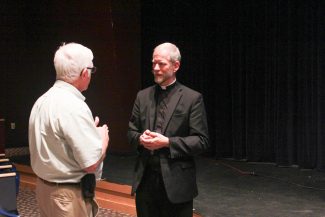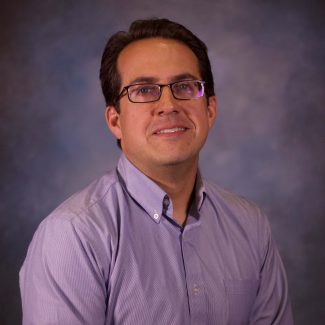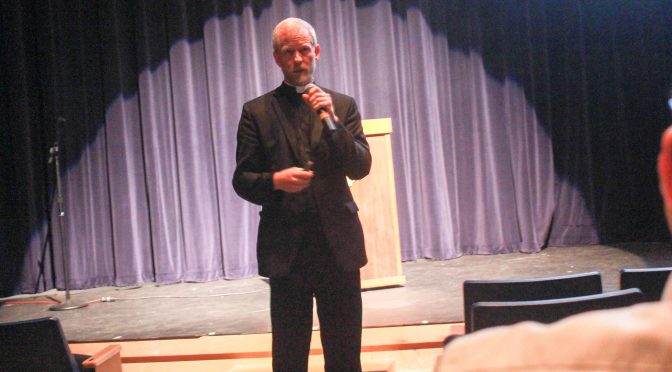The Gerber Institute hosted the Rev. Tadeusz Pacholczyk, Ph.D., who presented his talk “New Developments in the Biosciences and Bioethics” on Oct. 17 in the De Mattias Performance Hall at Newman University.
Pacholczyk is currently the director of education at the National Catholic Bioethics Center in Philadelphia. He writes and speaks widely on bioethics and medical ethics, and has testified before members of the Massachusetts, Wisconsin, Virginia and Oregon state legislatures during deliberations over stem cell research and cloning.

His keynote on Tuesday evening focused on the ethics of scientific research of stem cells and human cloning. When talking about stem cell research, he reviewed all the different types of research, noting that only one type raises significant moral indications.
“(Using embryonic stem cells) is going to raise intractable moral objections,” explained Pacholczyk, “because it is necessary to destroy, or as the scientist prefers to say, ‘to disaggregate,’ young humans in order to procure these cells for subsequent research.
“But the take-home message is that most forms of stem cell research are ethical. It’s only a tiny little sliver that raises grave moral concerns.”
As for human cloning, Pacholczyk said there really isn’t a good and bad.
He explained, “What happens is, scientists will say, ‘Well, there’s the bad kind of cloning … but the second kind of cloning is cloning for research or therapy. This is the good kind.’
“So you ask the question, which of these two forms of cloning is morally worse … it would be the therapeutic (cloning) because you’re making this life with the purpose of destroying it. You’re not even giving it a chance.”
Jenifer Leming, assistant professor of biology at Newman, was part of the audience.
“I thought it was a good talk for a general audience,” said Leming. “Especially the students that weren’t familiar with the science, it was very informational for them.”
Alexis Webb is a junior at Bishop Carroll High School and is thinking about becoming a pediatrician. She said that hearing what Pacholczyk had to say gave her a more positive outlook on stem cell research.
“One thing you hear about stem cell research is that it’s bad,” explained Webb. “But then you hear that there are other types of stem cell research that are good, it’s just the embryonic research that’s frowned upon. I had always seen stem cell research as a bad thing until now.”
Another Bishop Carroll student, senior Tam Ta said he came because he is interested in medical science and is currently exploring what field he would like to study.
“I am Roman Catholic so it’s good to hear what types of research aren’t good,” said Ta. “I will have to know the ethical side of it, and it (Pacholczyk’s keynote) really enlightened me. I had no opinion on the matter (stem cell research) before going into this, but after hearing him, he shed some light and influenced my opinion. Now I’m really interested in exploring this more and figuring out what’s wrong and right about this type of research.”
Mary Agnes, IHM (Immaculate Heart of Mary), is an educator at the high school level and teaches moral theology and Christian morality. She said medical moral ethics is something she touches on briefly in various areas.
“It’s nice as a teacher to have more background and information, especially on current topics,” said Sister Mary Agnes. “And Father Pacholczyk is very up to date — and he is probably the leading bioethicist out there — so being able to have his resourcefulness, his insight, all of that research is very helpful.”

Joshua Papsdorf, Ph.D., director of the Newman theology program and the Gerber Institute, said he was grateful for the opportunity to have Pacholczyk speak at Newman.
“I think how he was able to put these very complex scientific issues into a format that people could understand and then think about was a nice feature of the talk,” said Papsdorf. “Translating some of that terminology into something we could make sense of was really helpful. It seemed to really connect with the audience.
“Hopefully, it will spark some further thought and questions, and then students can take it back to their classes and keep thinking about it as they’re learning these things.”

